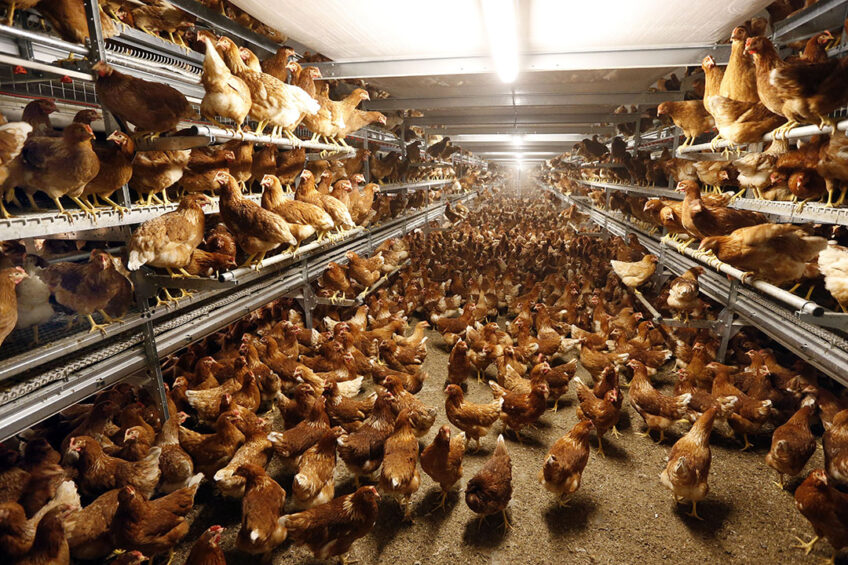Government urged to protect UK poultry producer standards

Standards of imported and domestically produced eggs in the UK need to be equal under new trade agreements drawn up by the UK government post-Brexit.
This call came from Mark Williams, British Egg Industry Council (BEIC) chief executive, who said it was vital that new welfare standards being introduced through Defra’s Action Plan for Animal Welfare did not discriminate against British farmers.
Defra has said its plan will “revolutionise the treatment of animals in the UK” and has promised to strengthen welfare measures for livestock and pets as well as recognising animals as “sentient beings”.
Speaking at the recent online Pig and Poultry Forums, Mr Williams said: “We keep telling the government that if you want to further raise our standards in this country on bird welfare, that does add cost, and you must not leave our back door open to lower standard eggs and egg products.”
Mr Williams said the sector was constantly under pressure on welfare challenges, including beak treatment, culling of day-old male chicks, new transport regulations that have said birds should not be transported if outdoor temperatures fall below 5C (40F) or above 25C (77F), and the move to cage free/barn systems by 2025. The revised Lion barn egg standard will be released shortly, he said, adding that it was important for contracts across the supply chain to be established to provide assurance for the market.
UK returns to 100% in-person assurance assessments
As Covid-19 restrictions eased, a leading UK farm assurance scheme notified poultry members it will return to 100% in-person assessments from 17 May. Find out more…
The egg industry has asked ADAS to provide guidance documents on carbon calculations for egg production so that the sector can enjoy standardised data rather than choosing from the plethora of carbon calculators currently on the market.
Covid-19 had led to the retail share of the UK egg market growing by nearly 10% within a year (59%-68%) as the foodservice sector contracted. Consumer egg purchasing continued to grow – up 15.8% in volume and 20.7% in value last year and a further 8.2% volume and 12.9% value growth up to 18 April this year. This means that the 40m laying hens currently on the ground would continue to grow.
Tom Willings, Chief Operating Officer Stonegate, said the sector still needed to become more transparent and closer to its consumers.
Mr Willings highlighted emissions reductions, responsible waste management, and soil and water health as key environmental challenges, but there were opportunities for the sector in producing more homegrown proteins, novel renewable energy creation, and narrowing the performance range.
Looking ahead at UK poultry trends: A retail update
UK retailer Marks and Spencer has moved to 100% British chicken, including ingredients, across its whole range of birds and has announced a rebrand of its Hubbard slower growing, welfare friendly bird. The retail chain previously sourced its chicken from a range of EU and British farms. Read more…
As genetic potential nears a glass ceiling, he said there were still opportunities for producers to reduce mortality rates and lost eggs, have a greater understanding and interpretation of data, intervene earlier when things were going awry, and integrate assurance.
Other changes in the future would include more regulatory and legislative demands, constraints on building development, greater emphasis on ecology, tighter manure management controls, carbon-footprinting, greater focus on feed, and extending bird lifecycles: “Whether these are challenges or opportunities will depend on our mindset,” he added.
Rebecca Tonks, chief executive of Cornish-based St Ewe Eggs, said the Covid-19 pandemic had affected the company in a number of ways, including:
- Packaging shortages
- Grading, packing, shielding and PPE
- Cash flow – 52% of customers were in the foodservice sector
- Surplus eggs – you cannot furlough a hen
- Donations to food banks – the company developed the concept of selling trays of eggs to the general public and the funds this generated helped cover the cost of packing eggs in 6pk cartons for the food banks. Over 200,000 eggs were donated.
However, the company had found a site for a new packing centre, receiving grant support and had received planning application approval. It had also launched a new brand “Super Eggs” and were sponsoring the successful Exeter Chiefs rugby team.
Join 31,000+ subscribers
Subscribe to our newsletter to stay updated about all the need-to-know content in the poultry sector, three times a week. Beheer
Beheer











 WP Admin
WP Admin  Bewerk bericht
Bewerk bericht